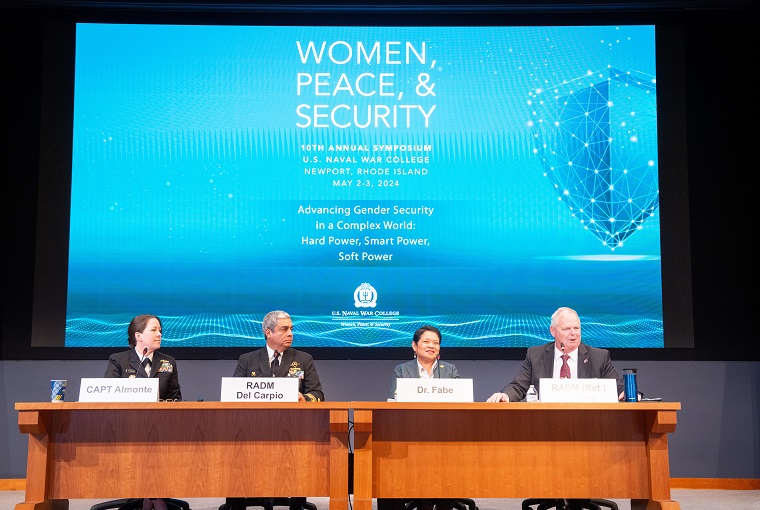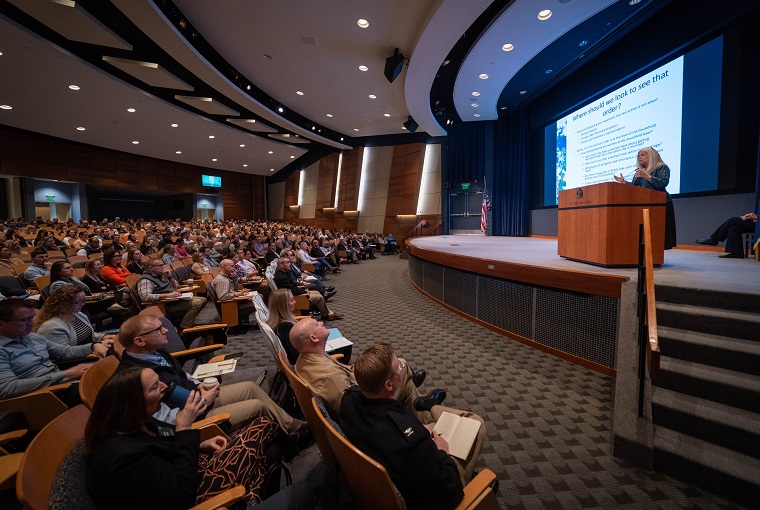U.S. Naval War College Hosts 10th Women, Peace, and Security Symposium

Newport, R.I.– The U.S. Naval War College (NWC) hosted the 10th iteration of its Women, Peace, and Security (WPS) Symposium onboard Naval Station Newport, May 2-3.
The symposium, themed “Advancing Gendered Security in a Complex World: Hard Power, Smart Power, Soft Power,” aimed to foster a shared understanding of the complex and dynamic global security environment through examination of women’s influence and experience as stakeholders and catalysts of change alongside men.
“Integrating the gender perspective into strategic plans and operations can be used to better understand hybrid threats, especially those that target civilian environments where adversaries may employ multifaceted strategies including disinformation, terrorism, and cyber violence, as well as economic and military tools,” stated Rear Adm. Pete Garvin, president of NWC, in his opening remarks. “Experience shows us that the gender lens is responsive to, and helps reduce, strategic and operational gaps in countering these challenges.”
The event welcomed 160 in-person and over 300 virtual attendants from more than 20 countries, allowing for cross collaboration with a variety of WPS subject matter experts from the U.S. Department of Defense, Department of State, the Department of the Navy and other service branches, professional military education (PME) institutions, and scholars and representatives from around the world. Participants included prominent U.S. and international military and government leaders, scholars, NWC faculty members and other national security practitioners.
Additionally, approximately 500 in-resident NWC students from every U.S. military branch, 11 civilian agencies and 58 partner and allied nations participated.

A keynote speech analyzing WPS from a strategic perspective was delivered by Valerie Hudson, Ph.D., University Distinguished Professor and George H.W. Bush Chair, Texas A&M University. Hudson offered that, from a national security perspective, disinterest in the knowledge, insights, concerns, and situation of half of humankind is like choosing to blind oneself in one eye.
“Whether we speak of situational awareness, of threat assessment, of tactics, or even of high-level strategy, using full vision is the only prudent course of action,” Hudson asserted. “We need WPS lenses to understand and manage the sources of insecurity in our own societies in order to address them and to more effectively prevent, handle, and recover from, conflict.”
Saira Yamin, Ph.D., the Ambassador Swanee Hunt Chair of Women, Peace, and Security at NWC summarized WPS as a broad-based framework that cuts across every traditional and non-traditional element of national security, providing a strategic, operational, and tactical lens to analyze and resolve evolving security threats.
“This annual symposium facilitates academic dialogue that recognizes this complexity and identifies opportunities to adapt and innovate in response to the changing face of conflict,” Yamin said.
Symposium attendees participated in nine panels supported by over 55 speakers covering a myriad of topics, including strengthening maritime security, cultivating allyship in defense and security sectors, WPS in an era of strategic competition, climate change and environmental security, leveraging WPS for force resiliency, and readiness and gender perspectives in strategic planning. Participants also engaged in a gender analysis exercise, keynote presentations, and fireside chats.
Rear Adm. Luis Del Carpio, director of the Peruvian Naval War College, noted that the symposium provided significant value via a network of people and ideas that can strengthen warfighting readiness in the maritime domain.
“The symposium is not only to talk about gender,” del Carpio said. “It is to talk to and about people, men and women, who have the capacity and skills to accomplish important work aboard ships, aircraft, and submarines.”
In reinforcing women’s perspectives and participation as critical to global security and innovative advantage, NWC's WPS Symposium supports various strategic directives, including the 2023 U.S. WPS Strategy and National Action Plan. The updated plan reflects critical shifts in the global landscape that require acute focus on core lines of effort made actionable in defense objectives that prioritize the safety, security, and meaningful participation of women across the Joint Force.
Information and ideas produced throughout the event will be published in a book for the benefit of students and faculty at NWC and other PME institutions in the U.S. and partner nations around the world, as well as U.S. government and military policy and decision makers.
As a leader in professional military education, NWC follows U.S. Department of Defense and Department of the Navy alignment with United Nations Security Council Resolution 1325, empowering women’s meaningful participation in all phases of planning and operations to generate outcomes advancing state and human security.
NWC has been committed to integrating WPS subject matter into its curriculum and faculty research since 2011 when the first WPS U.S. National Action Plan was launched.
NWC delivers excellence in education, research, and outreach, informing today’s decision-makers and educating tomorrow’s leaders. The college provides educational experiences and learning opportunities that develop students’ ability to anticipate and prepare strategically for the future, strengthen the foundations of peace, and create a decisive warfighting advantage.
